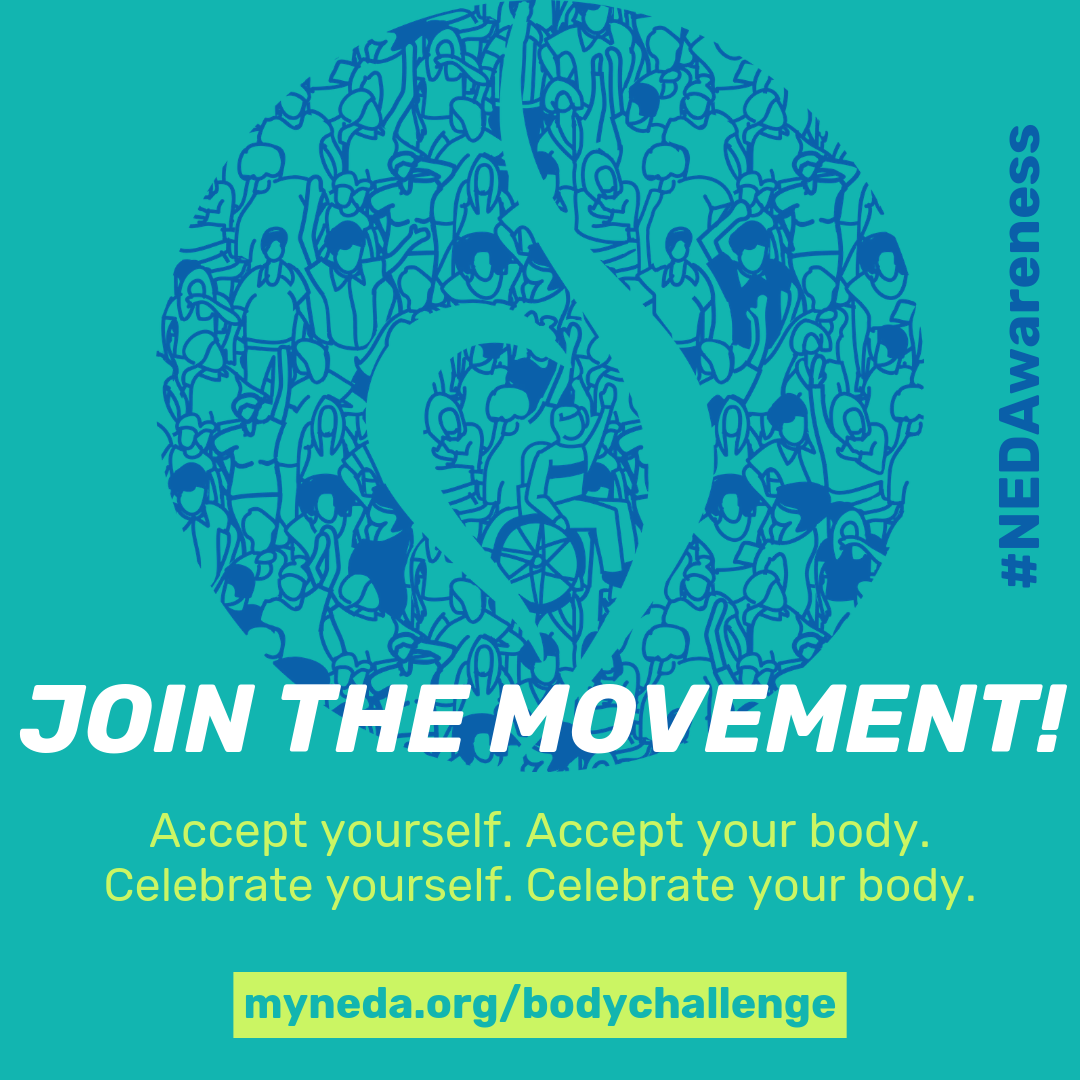Diets Can Be a Gateway to Disordered Eating
I love the theme for this year’s National Eating Disorders Awareness Week: Come as You Are. The National Eating Disorders Association (NEDA) is encouraging those in all stages of recovery to “come as you are” and share your eating disorder story. Someone who is suffering may identify with your story and it could help that person in tremendous ways.
“Come as you are” also sends the message that you DO NOT need to change your body in order to be happy and healthy. If you’re finding the constant quest to change yourself is exhausting, depressing, and leaving you feeling defeated, it may be time to work on something else … accepting who you are NOW. Show up in your life as you. Not some thinner, fitter version of you. Make peace with your body. Stop wasting time in your life to achieve some better version of yourself through fad diets and punishing exercise.
NEDA has tons of resources available this week (and always) to help ramp up eating disorders awareness. You can join the movement to body acceptance and sign the NEDA body acceptance challenge to pledge that you will accept and celebrate yourself and your body, rather than bash and constantly critique it.
Why do we want to accept our bodies? Because if we’re looking for ways to change through dieting, the act of dieting can offer more harm than good. This poster below paints a picture of what results from diets and so-called “clean eating”. Clean eating is a diet in disguise, much like the wellness movement. Once a person swears off certain foods in their diet in an attempt to “eat clean”, this is a form of restriction. Some may omit a food or food group from their diet and stick with it for days, weeks, and even months. But for most this restriction will not last, unless there is a medical reason they cannot eat that particular food (e.g., severe peanut allergy, celiac disease and gluten).
According to the stats on NEDA’s poster, people who diet moderately are FIVE times more likely to develop and eating disorder and those who restrict to the extreme are 18 times more likely to develop an eating disorder. Restriction leads to constant thoughts about the restricted food. This is obsession. Once a person “gives in” and finally eats the restricted food, they may find it difficult to stop. The person will then assume this nonstop eating must mean he is addicted to the food. Then guilt will follow.
Why did I eat that?
I have no willpower.
I am weak and will never lose weight.
95% of all dieters will regain the weight they lost. That’s crazy! It makes you wonder why we are all so obsessed with diets, cleanses, and insane workouts. If we do lose weight, the odds are stacked against us.
So does this mean we just throw in the towel and give up? Can we start eating whatever we want, whenever we want, because it’s just no use to try and lose weight to become healthy?
NOT EXACTLY.
What messages like this one by NEDA are trying to point out is that diets and losing weight are a temporary fix that can erupt into something worse down the road. Diets can have a major impact on psychological health. Our psychological health and well-being take a back seat at the expense of losing weight. What starts off as an innocent diet can lead us to feeling badly about ourselves when we fail. If the diet starts to work and weight does come off, this can lead to an irrational fear of weight gain and taking extreme actions to keep the weight off.
Most of us struggling with food know deep down inside…
IT’S NOT ABOUT THE FOOD!
Most of us already know ways to eat “healthy” or “normally'“. Because of diet culture most of us don’t want to listen to our bodies and would rather listen to a list of rules or an eating plan to tell us how to fuel ourselves. Many will choose quick fixes with a promise of rapid weight loss. After all, there’s always something society is telling us we need to get thin for:
Beach bodies are MADE in the winter!
My wedding is around the corner.
I need to look AWESOME for my high school reunion.
UGH. Enough. What would happen if we showed up to summer, our wedding, our reunion…. JUST THE WAY WE ARE?
As for our children, do we want them to mimic our dieting behaviors or the negative way we refer to our bodies? I’m sure we don’t … but it’s happening. Over one-half of teen girls and one-third of teen boys are skipping meals, fasting, smoking cigarettes, vomiting or using laxatives as a means to control their weight. Teens are going through body changes while in that in-between stage of their life from child to adult. They are comparing themselves to others making them quite vulnerable to diet culture messages. Kids will model the behaviors they learn and see at home. Studies have found that children who start dieting see greater weight gain and increased rates of binge eating for both boys and girls.
During this National Eating Disorders Awareness Week, try to make one change that can help you be more intuitive with your eating and less about diet rules. Work on ways to accept your body. What would this mean for you? What would you have to do to accept yourself the way you are RIGHT NOW? Buy new clothes in your current size? Throw away your “skinny jeans” that keep you feeling horrible about yourself? And what about your relationship with food? Can you think of a food you truly enjoy but restrict yourself from eating because it’s “BAD”? Why is this food “bad”? What is the worst thing that could happen if you ate it? Do you fear not being able to stop eating it? And how can you practice eating this food to the point of being satisfied but not bingeing?
Answer any of these questions in the comments. Think outside the dieting box and let me know how you can try to make a change!
Sources:
https://www.nationaleatingdisorders.org/dangers-dieting-clean-eating



